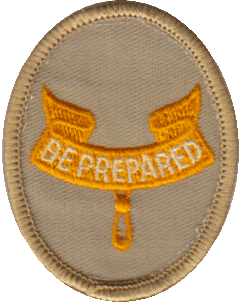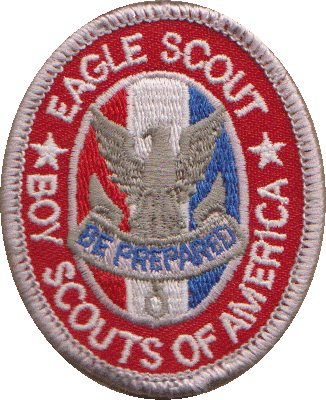Troop 8787 offers a complete advancement program, based on the regulations and procedures of the Boy Scouts of America.
Rank Advancement progresses from New Scout through First Class and culminates in the Eagle award depends upon the participation of the scout in the various troop activities and his demonstration as a way of life the BSA Code of Conduct (Scout Oath, Scout Law, & Scout Motto). Advancement is not possible without going on troop outings, and participating in troop sponsored service and fund raising activities.
Troop 8787 provides a climate which encourages the scout to advance as a natural course in his mastery of scout programs. In spite of this, the scout’s ability to advance will depend mainly on the scout’s own initiative. If a scout takes advantage of the troop programs and participates actively, he may reasonably expect to attain the rank of First Class within the first year. Advancement to Eagle may be achieved within another 2 years, however 4 years is not unreasonable time to accomplish the requirements for Eagle Scout.
The leadership of Troop 8787 places a great emphasis is on the individual scout demonstrating his ability to live by the 12 points of the Scout Law and the scout promise. This level of conduct must be demonstrated to be a way of life and not only adhered to during scout related activities. Advancement beyond First Class will be dependent on how well the individual scouts uphold and propagates the Scout Codes of Conduct.
Scouts earning rank advancements will be recognized at a Court of Honor after successfully completing the Board of Review and Scoutmaster Conference.
Primary Rank Advancements
Tenderfoot, 2nd Class, 1st Class will be signed off by the Scoutmaster or Assistant Scoutmasters. All rank advancement is tracked by computer using the “Troopmaster” program which is carefully tracked such that a scout’s status is available in very short order. It is the scout’s responsibility to submit updates to the records to the Troop Advancement Assistant Scoutmaster periodically. The best way to do this is to simply mark new or revised data on the latest computer form as soon as possible after the scout receive it. The completed computer form merely backs up the written records in the scout’s BSA Handbook
Advance Ranks
Star, Life & Eagle requirements will need to be signed off by the Scoutmaster or Advancement Assistant Scoutmaster. Eagle awards will only be given to the scout during a special Eagle Court of Honor.
The scout must serve satisfactorily in a BSA specified troop leadership position for 6 months while in rank to advance; many are available. It is the scout’s responsibility to make sure that he is in a position that will meet the rules. Leadership growth is a large part of the task. By the time a scout is progressing through the advanced ranks, he should be in direct position of line of authority such as Den Chief, Patrol Leader, Troop Guide, Assistant Senior Patrol Leader, Senior Patrol Leader or Instructor. Many of these positions are available only through peer election, or by appointment of the Troop Committee. Thus. participation in all forms of troop activities is crucial to obtain the required position.
In addition to satisfying leadership requirements the scout must demonstrate his understanding and application of the 12 Points of the Scout Law, The Scout Oath, and Scout Motto. The Troop’s Senior Scout leaders and Adult leaders should be in strong agreement that the scout demonstrated the values that Troop 8787 is trying to instill in each Star and Life scout prior to his advancement to this rank. Additionally this level of character and self control should be evident not only in scout sponsored activities but in all activities outside of scouting. (i.e. church, community, home, school, sports, social and work.)
To assist the scout in advancement through these ranks the Troop’s Adult leadership will conduct formal and informal appraisals of each scout that should assist both the scout and his parent/s understanding of his ability to meet the rank advancement requirements. The focus of this appraisal will be primarily on the values of scouting and the application of the Patrol Method to achieve intended results to successfully accomplish projects, assignments, task and the execution of leadership requirements.
The application of this appraisal is intended to provide an assessment of the individual scout by several leaders to assure fair appraisal of each scout as relates to scout skills, and values
Service Projects
Are required as a demonstration of Scout Spirit. Also, for Star and Life ranks, a Scout must perform 6 hours of service to others. Star and Life service projects may be approved for scouts assisting in the Eagle service projects. Since service projects are “attendance recorded” events, the Advancement Assistant Scoutmaster must approve and the calendar for the service project in advance.
Eagle
 The following comments apply only to Eagle and only within the Capitol Area Council – Blackland Prairie District.
The following comments apply only to Eagle and only within the Capitol Area Council – Blackland Prairie District.
Upon reaching Life rank, you will receive the “Life to Eagle” packet which includes the Eagle application and Eagle Service Project Workbook.
Application Obtain your complete advancement record from the Advancement Assistant Scoutmaster. This record should be consistent with the District’s records. If there are discrepancies now is the time to resolve the issues. Use this report to only to begin to complete your Eagle application. The District will confirm your application based on their records, not yours.
Project Carefully read the entire Service Project Workbook and pay attention to the instruction therein. The project description and [planning details must be approved and signed off on by the project beneficiary, Scoutmaster, Troop Committee Chairman and the district Coordinator BEFORE YOU BEGIN THE SERVICE PROJECT. A couple of visits with the District coordinator will be required.
This process can be frustrating if you let it be. It is required – consider it a test of your ability to communicate and persuade. It is very important that the scout conduct the communications with the various parties. Aside from being required it is good training since such skills are required to function in the real world.
Courts of Honor
These are held periodically, generally quarterly, to recognize Scouts for their personal achievement. It is the Scout’s responsibility to learn the advancement program. He can learn through discussions with his Patrol Leader, Senior Patrol Leader, or members of the adult leadership. His Scout Handbook and Boy Scout Requirements books are his best sources of information. It is the adult leader’s responsibility to provide a means for the Scout to set and accomplish his goals.
Scouts achieve “ranks” by completing advancement requirements. The Ranks available in Boy Scouting are:
Joining
Scout
Tenderfoot
Second Class
First Class
Star
Life
Eagle
All new scouts must accomplish the Joining Requirements to achieve the Scout rank. Scouts then begin working on the Tenderfoot, Second, and First Class ranks, which are basic skills requirements. The Star, Life, and Eagle ranks are characterized by having leadership, service, and merit badge requirements.
As a general guideline, Troop 8787 is oriented toward having new Scouts join the Troop in the February/March time frame. We then make every attempt to have these Scouts earn their Tenderfoot badge prior to the beginning of Summer Camp in the summer of the year they join. We provide the opportunities for these Scouts to complete their second and first class ranks prior to the next group of new Scouts joining. Scouts can then proceed on their Star, Life, and Eagle requirements. As a general rule, the Troop would like to make it possible for a Scout to earn his Eagle rank by the time he is 15 if this is of interest. This is very possible if the Scout and his parents work toward this objective.
